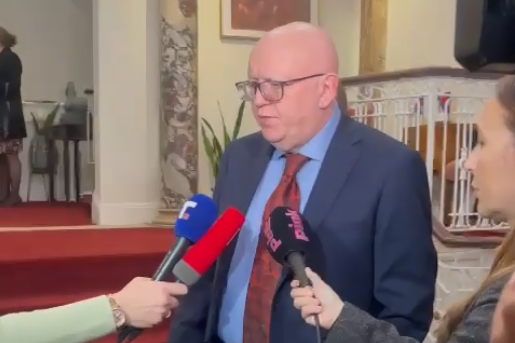Remarks to the press by Permanent Representative Vassily Nebenzia following meeting with President of Serbia, Aleksander Vučić, on the sidelines of UNSC meeting on Kosovo
Q: What was the topic of the conversation?
A: First, Russia and Serbia always have a lot to discuss. You know that our relations are strong. We are allies, we are friends. I would say we are brothers. And sisters, to be gender-correct. Of course, we discussed the meeting on Kosovo that took place today. That was a very telling meeting. It's important that Present Vučić personally participated, highlighting how important the issue is for Serbia. And it's important for the Balkans as a region. Of course, we discussed this infamous [UNGA] draft resolution on the genocide in Srebrenica. Germany and a few other countries are promoting [the draft resolution] and presenting it as benign and well-intended. But President Vučić and Russia, we know pretty well that it's a tricky exercise, which aims not at national reconciliation but quite at the contrary. It may stir up tensions in the Balkans and lead up to consequences that the authors of the resolution may not even have envisaged when they came up with it, unless they do that deliberately.
Q: What's Russia going to do about the resolution?
A: One thing of which I can assure you, we will never support such a resolution. I think there will be more countries than just Russia and Serbia who will not support it. This resolution opens a Pandora box of such initiatives. These are sensitive issues. We had the General Assembly resolution on Rwanda that was adopted after the genocide. Then, I think in 2009, we adopted a generic resolution on all kinds of genocide and the victims of genocide. Now, if such a resolution as the one on Srebrenica is adopted, it would pave the way for other countries that have similar issues to come with their own problems. I can cite you one thing. Germany that is behind that resolution (besides Bosnia, of course, although it's technically not an original co-sponsor) is responsible for the largest and the most cruel genocide in the 20th century, I mean the Second World War. I will not be surprised if at a certain moment, if such a resolution on Srebrenica is adopted, somebody, us including, will come up with a resolution on the genocide by Nazi Germany of the people of the Soviet Union during WW2. I know that Serbia has similar issues. It was also subject to genocide both in the First World War and the Second World War.
Q: Did you speak with President Putin about this resolution?
A: Of course we spoke with Moscow on that issue. Do not think that we are on different tracks. Of course, first of all, we are civil servants. We do what our center tells, but we have convictions, both in Moscow and here, that this is a very sly attempt to bring in an extremely politicized issue which will not help reconciliation in the Balkans, in Bosnia in particular. You know that this is a decision that was not taken according to the Bosnian Constitution. One entity comprising the Federation never gave its consent to such an initiative. There are plenty, a plethora of issues around it. But coming back to your question, of course, Moscow is fully aware what is happening with this issue. Thank you very much.
